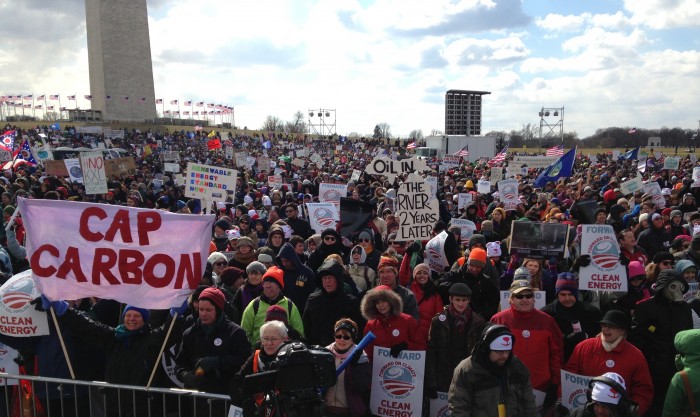I’m wondering why nearly everyone I know wants deeply to stop climate change and environmental destruction, and yet why almost no one I know attended yesterday evening’s nationwide rallies to stop the proposed Keystone Pipeline.
It is a critical political moment, and being out there in force could help turn the tide and stop this project that so many of us oppose once and for all.
So I asked a friend. He said, “No judgment, but I don’t believe protests do anything or have ever done anything.”
I was stunned to hear that remark. Then I wondered if rather than callous indifference, most people agree with his sentiment.
I learned the power of protest at an early age. It was a cold New York winter, and I was six years old. My father took me to visit my mother on the picket line in Midtown Manhattan. A recent immigrant, she, like so many Americans, had collaborated in secret with a few fellow employees to organize a union at her workplace, and then led a strike for better wages and benefits. They kept at it for two years.
As I got older, I studied grassroots movements. I learned that for hundreds of years, protest has indeed led to specific and massive changes that certainly would not have come about had people not taken to the streets in great numbers. The examples are incalculable, yet they are worthy of a quick review.
Worldwide, popular protests led to the fall of British rule in India, the end of apartheid in South Africa, the demise of Egypt’s Hosni Mubarak, and some might say, helped facilitate the fall of Soviet hegemony over Eastern Europe. That’s freedom for a good 1.5 billion people, and it is just the popular tip of a very large iceberg.
The U.S. itself has a rich history of protest. It has brought about a dazzling array of change, including:
* Mass protest in 2000 successfully blocked the World Trade Organization from meeting and passing what would have been devastating policies for workers and the environment (I was there).
* Mass protests led to the eventual end of the Vietnam War (internal records show Richard Nixon’s advisor’s telling him privately in the early 1970s that if he escalated the war further—as he wanted to do—he might lose control of the country).
* Protests by farm workers led to the right to organize unions and bargain collectively for higher wages and healthier working conditions.
* Repeated protests, culminating in the 1950s and 1960s, successfully pressured the Federal Government to end legal segregation in the U.S. South and use force, if necessary, to defend the right of African-Americans to vote and go to school.
* Decades of grassroots protest led to the creation of most every U.S. social program, environmental protection and labor protection we have (think concepts like the “Weekend” and the 40-hour workweek).
* Decades of grassroots protest got women the right to vote.
There are hundreds more national examples, and perhaps millions of local examples. Protests by people in New York recently led several towns, and then the entire state, to ban fracking. Recent protests by Stanford students convinced the school to divest from coal. And so on, and so on, and so on.
I’ve been privileged to be involved with several local campaigns. Here are two that stand out:
* In 2000, the Boston Red Sox wanted $600 million in taxpayer money and 10 acres of private land seized by the city to build a bigger, more profitable baseball stadium. Similar deals had been passed in dozens of U.S. cities, and the mayor and most city councilors backed it. I worked with other community leaders to bring together a coalition of community members, small businesses, students, community activists and fans of the old stadium. Thanks to grassroots protest, most city councilors ended up opposing the deal, and it was killed.
* In 2013, a developer backed by Chevron, one of the wealthiest corporations on the planet, wanted to build a gas station in my small town. It was easily approved by the planning commission. But when 150 people braved freezing temperatures and the tedium that is local government to vociferously protest the project at two public meetings that usually draw 10 people, the approval was reversed and Chevron was banned for good.
From small towns to the largest nations, protests have repeatedly changed the course of history and improved the lives of millions.
Yet protest can also seem to go nowhere—especially at first.
That was the case in 1963, when 25 people at a time would gather in U.S. cities to protest the Vietnam War. At best, they were ignored. At worst, they were branded as traitors.
But that was just the beginning. The next year, hundreds protested. The year after that, thousands. Five years later, hundreds of thousands took to the streets. And five years after that, the U.S. ended its war.
It is rare that protest leads to an immediate victory, especially in the face of large-scale challenges that require long, well thought out campaigns. The key is to see the value in persistence and to adopt the long view. And to recognize the myriad benefits protest brings beyond specific changes in laws or policies.
Protest inspires those involved to continued, heartfelt action. It leads to powerful new connections and alliances, and generates media coverage for causes that don’t have the money to buy it.
Protest gives good elected officials the cover they need to pursue actions that are politically risky yet morally just, and causes middle of the road elected officials to reconsider and change their minds. It can also pressure the most regressive elected officials into abandoning really bad ideas.
Protest can sometimes lead to new governing parties. Other times, it leads to new forms of government entirely.
In the case of Vietnam, a decade of protest fundamentally altered U.S. culture in innumerable ways. It radicalized an entire generation, led to profound shifts in cultural norms, and fostered a deep, healthy mistrust of U.S. militarism.
Recent anti-police brutality protests have not ended police brutality. But they have instigated a critical new conversation on race and policing, created new alliances, engaged a new generation of activists, and caused the Federal Government to institute some changes.
Recent environmental protests have not led to nearly enough action to stabilize the climate. But they have inspired millions and given valuable political cover to the President of the United States—the first president in U.S. history to make combating climate change a major issue, seemingly overnight.
Will the U.S. take meaningful action to curb climate change or police brutality? We don’t know. But we do know that if people don’t protest, there is, more or less, zero chance anything positive will happen on these issues. And I believe that if history is any guide, if enough people do continue to take action for enough time, truly significant change will come.
Why is President Obama taking the unusually bold political step of vowing to veto an oil pipeline? Because tens of thousands of Americans have spent years protesting.
Protest is, of course, not the only tool we have. But it is a critical tool. Yet I can understand the resistance to it.
It can seem senseless to stand on a street corner holding a sign in the cold or the rain, especially when our numbers are small. It takes up our time. It can take a very long time to see change, if it ever comes. And sometimes, we fail.
I was in Middle School when I watched those brave Chinese students peacefully take over Tiananmen Square for the cause of freedom, only to be brutally gunned down by their own military. Many of us remember what it felt like to clutch peace signs in the cold, only to see our country lied to, war waged on Iraq, and so many people die so senselessly. My mother, for example, did not win her battle at work.
Protest can break our hearts. When governments use violence. When The People fail. And, perhaps most potently, when hard-won wins are taken back.
That’s what seemed to happen in Egypt these past few years, when pro-democracy protesters overthrew Hosni Mubarak, only to see that nation’s first democratically elected (albeit backwards and inept) government in their 5,000-year history overthrown in a yet another military coup.
Last summer, I met an Egyptian activist, a young woman who was part of that brave and beautiful movement to oust Mubarak and bring freedom to Egypt. She and her friends had risked bullets, beatings and torture to do the unthinkable—to unite the country and overthrow a 40-year military dictatorship.
“How do you feel now that the military is back in charge?” I asked her.
“Of course it’s not good, but I feel OK about it,” she said calmly. “These things take time,” she told me, smiling gently. “It may take 30 or 40 years to get democracy, but we will get it.”
Love elephant and want to go steady?
Sign up for our (curated) daily and weekly newsletters!
Author: Roni Krouzman
Editor: Travis May
Photo: Wikipedia






Read 0 comments and reply